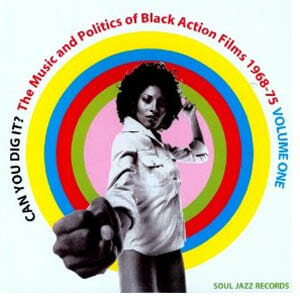Introducing Endless Mode: A New Games & Anime Site from Paste
Compilation collects sound of aninfamous genre
In 1971, Gordon Parks’ low-budget shoot-’em-up Shaft grossed $12 million and ushered in a new genre: Black Action. By 1976, the 50-odd films directed, acted, produced and scored by black professionals had been dubbed “Blaxploitation” by the NAACP and sparked so much protest from the Congress for Racial Equality that Hollywood essentially stopped funding them. African-American academia had good reason for shunning flicks like Shaft, Super Fly and Foxy Brown. Featuring black dealers, prostitutes and vigilantes as protagonists, the films peddled hard-boiled hustler stereotypes and luxuriated in the very myths they created. Pushers drove Cadillac Eldorados and sniffed blow off golden platters. Street-wise cops single-handedly overthrew the white mafia. Hookers whooped The Man.
Troublesome as it was, Blaxploitation birthed a host of larger-than-life anti-heroes who even now refuse to fade into the particleboard woodwork of the ’70s. Characters like Shaft, Youngblood Priest and Coffy all had one thing in common: They were hopelessly netted in a global system—the drug trade, the sex-and-drug trade, the corrupt police force—and squirming to get out. That they always managed to wiggle (or kung fu fight) free was more than extreme wishful thinking. It was a desperately hopeful re-telling of the American fable of individualism, set smack in the middle of the last place true individualism was possible: the ?integrated, graffiti-swathed, neon-lit cities of the post-Civil Rights era.
The complexities teeming beneath the surface of these films live on in their scores. Soul Jazz’s two-disc, 34-song compilation Can You Dig It? is the soundtrack to half a decade of controversial cinema, boasting originals from Isaac Hayes, Curtis Mayfield, Booker T and the MG’s and Roy Ayers, among many others, and capturing all the subtlety and nuance the films avoid.
Granted, the lyrics are often about as formulaic as the characters themselves. In the now-ubiquitous “Shaft,” Hayes asks “Who’s the black private dick / That’s a sex machine to all the chicks?” while a girl-group ensemble declares: “Shaft!” But the anxieties of the era can be felt far more deeply in the music itself. Though many of the songs—“Shaft” and Bobby Womack’s “Across 110th Street” to name a few—sound like blasé coasting tunes on first listen, with their wah-wah-distorted chords bouncing like shocks on a low-rider, a different narrative emerges in the percussion. The rattling gourds and echoing steel-drum and bongo beats of J.J. Johnson’s “Willie Chase” and The Impressions’ “Make A Resolution” evoke the genre’s back-to-Africa nostalgia and flirtation with black nationalism. And just as the shadow of the segregated ’50s lurks around the edges of Black Action, the syncopated drum flicks and off-the-cuff sax solos in “Sweetback’s Theme” (Brer Soul & Earth, Wind & Fire) and “They Call Me MISTER Tibbs” (Quincy Jones) hint at the earlier bebop movement.
Embodying and subverting the stereotypes of Blaxploitation most completely is Curtis Mayfield’s “Pusherman.” He creates a standard wheelin’-and-dealin’ trickster-figure in the opening lyrics (“I’m your mama, I’m your daddy, I’m that nigger in the alley / I’m your doctor when you need, want some coke, have some weed”) before his eerily high voice slides down into a persuasive “I’m your pusherman.” But the carefree demeanor of this “I’ll-be-anything-you-want” character is undercut by tinny drums throbbing as irregularly as a skipping heartbeat. As if trying to convince himself, Mayfield repeats “got to get mellow now, got to get mellow, y’all,” until the refrain is nearly frantic.
Thirty-four years after Black Action films were red-taped, the themes still resonate, and not just on this compilation. The genre was knighted with Cult Status when Quentin Tarantino cast Pam Grier in 1997’s Jackie Brown, and Austin Powers in Goldmember followed suit in 2002 with Beyoncé as the cartoonish Foxxy Cleopatra; the carefully crafted “gangsta sells” personas of contemporary rappers draw from these contentious flicks, too. Ultimately, though, what lives on more than anything else from Blaxploitation is Mayfield’s downward-spiraling refrain. It’s the sound of a proud outsider losing to a web of forces bigger than himself.
